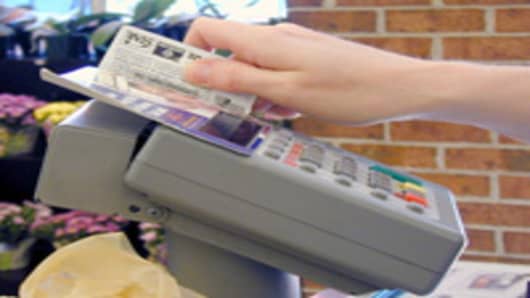Consumers have boosted their borrowing at the fastest pace in three months, turning increasingly to their credit cards to replace home equity loans as a source of ready cash.
The Federal Reserve reported that consumer credit rose at an annual rate of 5.9 percent in August, the biggest increase since a 7.9 percent jump in May.
The increase was led by an 8.1 percent jump in revolving credit, the category that includes credit card loans. Consumer have been using their credit cards more to finance purchases now that home equity lines of credit are becoming harder to obtain.
Non-revolving credit, which includes auto loans, also rose at a faster pace in August, increasing at an annual rate of 4.7 percent, compared to gains of 3.1 percent in July and 4 percent in June.
In total, consumer credit rose by $12.2 billion to a record $2.469 trillion. The increase was bigger than the $9.5 billion gain analysts had been expecting.
During the housing boom, when home sales were hitting records for five consecutive years and prices were soaring, many homeowners tapped the rising value of their homes to finance increased spending by taking out home equity lines of credit.
However, now that home sales are plunging and double-digit increases in housing costs are a thing of the past, home equity lines of credit have become less available. That has pushed consumers back to credit cards to finance their spending.
Analysts are watching closely to see if the steepest slump in housing in 16 years could have a more serious impact on the economy through the wealth effect.
Just as rising home values had encouraged consumers to spend more during the housing boom, the fear is that falling home values could cause consumers to cut back on their purchases. Since consumer spending accounts for two-thirds of total economic activity, any serious cutback in spending could lead to much slower economic growth.
However, the Labor Department reported Friday that businesses added 110,000 jobs in September and a worrisome drop of 4,000 jobs in August was revised away to show instead a gain of 89,000 jobs during the month, easing worries about a possible recession.


